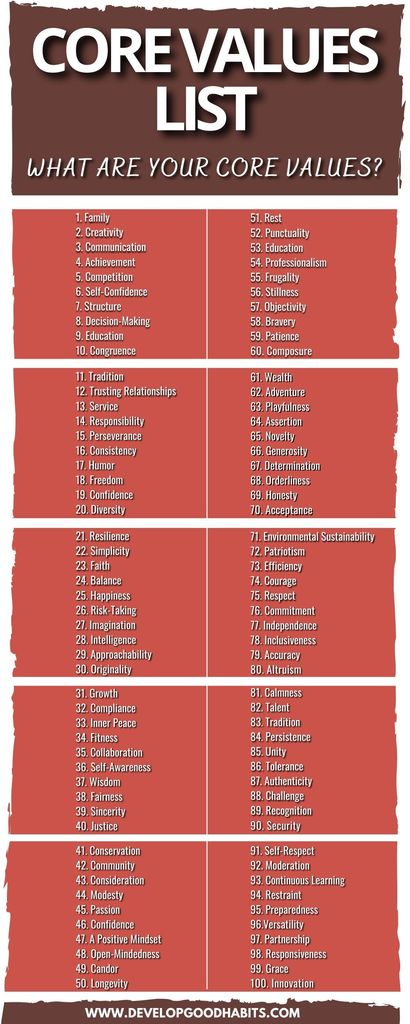There might be affiliate links on this page, which means we get a small commission of anything you buy. As an Amazon Associate we earn from qualifying purchases. Please do your own research before making any online purchase.
Did you know that the average adult makes 35,000 decisions per day?
And, fun fact: 226.7 of these decisions are based on food alone.
But what guides the process behind making the choices that you do? What influences your decisions?
If you stop to think about why you have chosen your career path or the city in which you live, you will realize that your core values start to come into play.
Your personal core values are what encompass your foundational beliefs, which then dictate your behavior and guide you to make the decisions that you do.
Your values are broad concepts that can be reapplied many times over in your life in various situations to guide your actions.
Your core values are not something that you choose for yourself. Rather, they’re feelings and beliefs that operate in the background of your mind and influence your behavior. You discover what your values are through life experiences and during the process of building self-awareness.
In this article, I will give you a step-by-step guide on how to discover your own personal core values. Then, I will offer 100 examples of personal core values, each with a short explanation, so you can determine which values resonate with you.
Why Are Core Values Important?
Having personal core values is important for personal development because they help you make intelligent decisions that are going to work in your favor by playing into your strengths, wants, and needs.
When looking at your path toward personal development, you have to keep your personal core values in mind to help you achieve your goals. Without reflecting upon your values, you will simply react to circumstances by making careless decisions that will hold you back in the long run.
For example, let’s say you get offered a job two hours away from home and you immediately take it because it will result in a salary increase. You don’t consider any other factors or implications, you just assume that a salary increase means a better life.
However, three months into the job, you realize the cost of living in the new city is much higher, your commute is twice as long, and you really miss seeing your family throughout the week.
Without stopping to really consider your personal core values before accepting the job offer, you unintentionally took a big step backward in terms of personal development.
When you’re aware of your core values, the road to personal development will be much easier because you will innately know what factors in your life you want to focus on in order to be fulfilled.
Your goals will be clear because you will recognize your passions and what makes you happy, and you will align your actions with your skills in order to ultimately be successful.
However, as we mentioned, your personal core values are something that you discover, not something that you choose. So how are you supposed to know what these are and therefore live accordingly?
This may happen by chance. When I was in my late teens, I lived a rather unhealthy lifestyle. I ate a lot of fast food, never considered going to the gym, would park myself in front of the television for hours, and stay out late with my friends, leaving me with little time to sleep.
It wasn’t long before this lifestyle caught up with me. I became very ill, and my routine–and priorities–had to take a quick turn.
My focus turned from French fries to green smoothies and my love for reality television transitioned into a love for running.
While I still loved to spend time with my friends, I turned more of that energy toward my family and became mindful and present at family dinners, listening to what was going on in everyone’s lives rather than sneaking text messages under the table and rushing out at soon as the plates were cleared.
I realized that my personal core values revolved around my physical and mental health. Discovering this sense of clarity dramatically changed my life. Not only did my diet and exercise regimen change, I was also better equipped to make everyday choices that were in my own best interest.
For example, at 18, when faced with a large pizza and some cupcakes, I would tell myself, “I’ll probably regret this later” but that wouldn’t stop me from digging in.
Now, I don’t have to fight an internal battle with impulse control because I know these things aren’t good for me, and enjoying the taste of these types of food for 2 minutes is not a price I am willing to pay for the cost in the end. Instead, I continue to live a healthy lifestyle because it supports my personal core values.
When it comes to my own personal development, living in line with my core values has catapulted me into a life that I consider to be fulfilling and successful, which ultimately is the only person who matters in this equation.
Let’s start by taking a look at how you can discover your own core values. You may think that your values should be obvious to you, but the truth is, most people don’t just automatically know their core values without doing some self-discovery.
Rather, people assume that whatever their society or culture values pretty much sums up what is important to them as well. If the norm is to graduate from college, get married, have a baby, and live happily ever after is what people just do, that must be what you want to do then too…right?
It‘s easy to come up with a list of things that you should value. But actually discovering what you truly value takes some effort.
RELATED: Habits that Stick!
Want to build a new habit that will stick for the rest of your lifetime? In this video, you will discover a simple 9-step process about building habits that you can immediately implement.
How to Discover Your Core Values
Step 1: Do some self-reflection.
Reading lists of values can be helpful if you’re looking for ideas regarding the things in life that other people consider to be their core values.
While you won’t be able to choose your favorite 5 out of 10 (for example) and call them your own, you will notice some values that stand out from the others and resonate with you.
As you’re doing some self-reflection, think about some moments in your life that have been especially meaningful to you or experiences that you consider to be a highlight of your life. What was going on during those times, who were you with, and what were you doing?
Alternatively, think about the exact opposite–the times in your life where you were angry or frustrated. What was causing the frustration? Was a value being suppressed?
For example, have you been miserable in a job where you were micromanaged and monitored constantly? This may help you realize that you value autonomy and a sense of freedom.
Finally, what gives you a sense of fulfillment in your life? Being creative? Going on adventures? Learning new things? These would be things that are of particular value to you.
Write down all of the values that you have come up with so far.
(You can also take these free core values quizzes or answer these core values worksheets to help you get started.)
Step 2: Consolidate.
Identify themes from the large list of values that you just created and create some groups.
For example, if you have loyalty, commitment, and honesty all listed, group them together to create a core value of “human relationships”. Or, if you have optimism, motivation, and inspiration all on your list, you can call that something such as “progress”.
Step 3: Identify your principal core values.
There are a few things that you can then consider in order to reduce your list even further. Which values that you’ve listed are a fundamental part of your life? Which ones define your everyday actions and long term goals?
Because everyone is unique, your personal core values truly only matter to you. You know your strengths and weaknesses and how your priorities play into supporting the areas of your life in which you excel.
Choose only 5 core values off of your list. If you have too few, your unique core values won’t define your individuality. However, if you have too many, you won’t put the amount of focus on any of them that is needed in order to leverage your personal development.
Step 4: Rank them.
Pick the value that is of most importance to you and go down from there. Once you have come up with your ranking, wait a few days and look at your list again.
See if you still feel like you have ranked your core values in the right order, or take some time to move some around. This may take several tries before you feel absolutely confident.
Treat this as a living document. You can always revisit your values and analyze how they make you feel. While some of your values may be very consistent with the person you are today, that may change over a period of time. You should always be sure that your values feel personal and unique to your identity.
To ensure that you’re living in line with your personal core values, refer to the list that you have created every month and rate yourself on how well you’re honoring each value on an everyday basis.
If your level of satisfaction with one of your values declines over time, consider some changes that you could make to improve on this. Create some action steps that will deliberately bring you closer to living in line with your values.
For example, if one of your values is progress or learning and you don’t feel like you have gained any new knowledge or experiences lately, make the decision to read 2 books per month until you feel like your personal rating begins to improve.
Now that you know how to create your core personal values, let’s look at some core value examples that may give you some insight into what you truly value in your own life.
100 Examples of Core Values
1. Family
Whomever you consider to be your “family” may be a primary value to you because they provide you with support and companionship.
Family is often a core value in people’s lives and influences decisions such as where to live and how to celebrate holidays. (Learn how to discover your family's core values in this post.)
2. Creativity
If you value creativity, you enjoy using your imagination to solve problems or generate new ideas. Valuing creativity supports your ability to make a change in society that other people find significant.
3. Communication
Valuing communication involves not only having information relayed properly to you, but also ensuring that your own thoughts are effectively heard by other people.
4. Achievement
Accomplishing something in your life or work that is noteworthy could be something that adds a unique sense of value to your life. Your achievement values impact your motivation because your incentive to work outweighs the cost of doing so.

5. Competition
Holding a value of competition means that you are able to gain energy through a sense of rivalry to be the most respected in a domain. But it's important to learn the difference between healthy and unhealthy competition.
6. Self-Confidence
Having this value involves being successful in such a way that you recognize your skills are making a positive contribution to your community or those around you.
7. Structure
Valuing structure involves having a sense of control over your surroundings and exercising discipline to maintain an acceptable level of restriction.
8. Decision-Making
Taking personal responsibility for initiating a course of action may be of high value to you. This means that you find it fulfilling to act according to your own conscience without having to be prompted by an external force.
9. Education
Aside from achieving a certification of educational accomplishment, valuing education involves the process of being a lifelong learner and continuing to gain understanding through perceptive insight.
10. Congruence
This involves being true to your authentic self and communicating to others externally in a way that matches your internal thoughts and feelings.
11. Tradition
Valuing tradition would involve ritualizing some sort of history in your life to add a sense of enrichment, and passing that on to subsequent generations.
12. Trusting Relationships
Valuing trusting relationships means that one of your top priorities is to be able to express your thoughts and feelings in a mutually trusting environment where you and the other person have confidence in the integrity of one another.
13. Service
When one of your personal core values is service, you find a sense of fulfillment in sharing your talents or abilities with others in a way that is beneficial to their lives, and you’re willing to contribute to your society without expecting anything in return.
14. Responsibility
Some people strongly value having a sense of sole personal accountability for the success of a specific area of their community or group. This often promotes self-confidence and can lead to a deep sense of accomplishment.
15. Perseverance
People who become very successful have undoubtedly failed more often throughout their lives than many others have even tried. It is easy to quit, but perseverance pays off.

16. Consistency
Consistency often gives people reassurance in the decisions that they make because they can rely on a certain process that they’re used to. (Read our post about the rules of consistency.)
17. Humor
This should not be overlooked when it comes to values, as humor can make a big difference in lightening the load of a difficult situation. When used appropriately, humor can be an effective tool.
18. Freedom
This is a value that most people hold close to their hearts–and it doesn’t only involve valuing your own freedom–it also encompasses advocating from freedom if you ever see an opportunity to do so.
19. Confidence
Being confident often helps people trust you and your decisions. When you value confidence, it suggests you also value competence.
20. Diversity
Diversity isn’t only about accepting people from different cultures; it is about seeking out opportunities to interact with people who have various backgrounds in order to learn new perspectives.
21. Resilience
How easy is it for you to cope with adversity? If you value resilience, you strive to be flexible, go with the flow, and bounce back after things don’t go your way.
22. Simplicity
People tend to make things more complicated than they need to be. Those who prefer to keep things straightforward are those who value simplicity.
If you want to learn more about how to live simply, here are the best books on minimalism to help you start simplifying your life.
23. Faith
Valuing faith can look different to everybody, but it often refers to believing that everything will work out the way that it is supposed to. When you value faith, you will allow your beliefs to guide your decisions.
24. Balance
If one of your personal core values is balance, you prevent any one thing from taking over your life. Between your career, family, friends, and hobbies, you make sure to keep your own personal enjoyment in mind and you level out your stress with relaxation.
25. Happiness
While this may seem obvious, many people don’t take the time to truly find what makes them happy to then be able to plan their lives around those things.
26. Risk-Taking
If you value taking risks, you know that if you follow your gut, there is a chance that it will lead to a huge payoff. You’re not afraid to face the option of failing if there is also an option for success.
27. Imagination
Valuing imagination can be a huge advantage to anyone in our fast-paced society. Being able to come up with an idea that no one else has thought of before can be a huge part of being successful.
28. Intelligence
Valuing intelligence isn’t just acknowledging your natural born ability to understand concepts. It involves constantly yearning to learn more.
29. Approachability
People who hold a personal core value of being approachable want others to feel free to come to them with problems. People who want to be approachable often easily gain the trust of other people.
30. Originality
Valuing originality means that you walk your own path and stray away from what everyone else seems to be doing. This value comes naturally and can usually be seen through art or creativity.
31. Growth
People who value growth are never willing to settle and always look for an opportunity to learn in the face of adversity.

32. Compliance
Being compliant does not mean you’re weak. There is a lot of value in having the ability to follow directions or take the advice of a superior.
33. Inner Peace
This personal core value refers to the ability to be comfortable with yourself, the people around you, and being accepting of the life you’re living.
34. Fitness
Valuing fitness will help you give energy toward the other values in your life. If your body is healthy, your mind can be healthy as well.
35. Collaboration
Working together by sharing your ideas with others can result in accomplishing something great. Collaborating with others will often lead to something that is greater than the sum of its parts.
36. Self-Awareness
This is a very important core value to have, as it lets you realize when you’ve messed up and pinpoint how you can fix your mistakes in the future.
Having self-awareness also means you know why you react to certain situations in the way that you do and recognize triggers that may lead to certain emotions.
37. Wisdom
Valuing wisdom isn’t just about putting an emphasis on knowledge. It is also about having your knowledge stand the test of time and being able to reflect on your experiences to exact your knowledge.
38. Fairness
While it is true that people say life is not fair, this doesn’t mean that you shouldn’t strive to make it that way. When you value fairness, you can also establish trust and dependability with other people.
39. Sincerity
This can go hand-in-hand with honesty, but it also involves being authentic in everything you say and avoiding putting on any type of front to impress other people.
40. Justice
Valuing justice means that you feel a personal sense of responsibility to achieve equality in the world and you feel compassion for those who are not treated fairly.
(Learning about confirmation bias is a step in the right direction if you want to treat other fairly.)
41. Conservation
Wanting to conserve what you currently have and not constantly seeking more resources to consume is an important value to have. When you value conservation, there is a good chance that you are satisfied with the things you have and content in your life.
42. Community
Valuing community means striving to create a sense of belongingness in your surroundings and being willing to give back to places that have contributed to who you are today.
43. Consideration
Being considerate of others, even if they aren’t around, is a strong value to have. This means leaving places better than you found them and keeping other people’s needs in mind.
44. Modesty
If you value modesty, you let your actions speak for themselves and avoid boasting about your abilities.
45. Passion
Having enthusiasm for living your life on your own terms will ensure that you also have the determination that is needed to succeed. (Check out this post about passion project ideas.)
46. Confidence
Your confidence is the sense of value that you place on yourself and the faith you have in your own capabilities. It gives you the strength to pursue what you want in life.
47. A Positive Mindset
Staying positive and looking for the silver lining in any troubles that you face can help you achieve your desired results.
48. Open-Mindedness
Even if you don’t think you will agree with an idea or concept, being able to consider it and be willing to entertain a variety of ideas is a good value to have.
49. Candor
Being able to tell things like they are is a helpful core value because many people shy away from the truth in fear of hurting others or becoming chastised.
50. Longevity
Those who value longevity seek to live in a healthy way in order to spend more time on earth with the ones they love.

51. Rest
Knowing when to stop is a huge factor in success. You need to rest your body and your mind to be on top of your game when it really counts.
52. Punctuality
The thing about valuing punctuality is that it shows a great respect for other people’s time as well. This allows people to depend on you and hopefully have a mutual respect for your time as well.
53. Education
Those who value education know that it is never too late to learn–even in a formal learning environment.
54. Professionalism
This isn’t just about knowing how to act professionally in the workplace. It is also about knowing how to be polite, use good manners, and be dependable in your everyday life.
55. Frugality
Having a natural tendency to spend money conservatively suggests that you value frugality. This also means you’re looking toward the future and not focusing on immediate satisfaction.
56. Stillness
Embracing silence or calmness can not only be a great value to have, but also a great skill. Those who know when to speak and when to listen are often highly respected.
57. Objectivity
It is helpful to value objectivity in the workplace because it means you’re willing to look at the facts when you’re confronted with a conflict. You’re able to put your emotions and personal involvement aside.
58. Bravery
When one of your personal core values is bravery, it means that you always do the right thing, even if you’re the only person making the tough decision.
59. Patience
Valuing patience means recognizing the fact that sometimes the only thing that can make something work out in your favor is time.
60. Composure
The ability to remain calm in the face of adversity and control your emotions helps people trust you and feel like you’re a reliable and poised person.
61. Wealth
Whether you value wealth to be able to provide for your family or to be able to live a peaceful life, this is a personal core value that isn’t as selfish as it may sound.
62. Adventure
Those who value adventure lead rich and exciting lives by seeking out new experiences to expand their skills and existence.
63. Playfulness
If you can really appreciate a good break from hard work to have a laugh, you probably value playfulness. Letting your mind relax is healthy in order to be really effective once you get back to work.
64. Assertion
Those who value being assertive know what they want, act quickly to obtain it, and do what they have to do to be successful.
65. Novelty
Some value the pursuit of new challenges, circumstances, and experiences in life. If you live in the same town where you were born and tend to stick to a routine, novelty is likely not one of your personal core values.
66. Generosity
If you value generosity, you understand that it doesn’t just involve giving other people money or tangible items. You can also be generous with your time, compassion, and energy.
67. Determination
Refusing to give up when things get tough changes challenging situations into opportunities for triumph.
68. Orderliness
Many people have a hard time making any personal progress if they’re living in a chaotic environment. Cleanliness and orderliness are often values people hold to maintain a calm state of mind.
69. Honesty
It is very difficult to repair a bad reputation, especially if it is one that suggests you cannot be trusted. Telling the truth and sticking to your word are both critical in the long run, which makes diligently protecting your reputation an important value. (Check this collection of honesty quotes.)
70. Acceptance
Our world has billions of people in it–all of whom are somehow unique. Being able to accept people who are completely different from you can help increase the pleasure and enlightenment in your life.
Update to Core Values List
71. Environmental Sustainability
Both individuals and companies are becoming increasingly concerned about environmental sustainability to protect the earth for future generations in addition to our own.
According to the EPA, air pollution can increase one’s risk of suffering from health issues such as heart attacks, lung disease, and premature mortality.
Further, the CDC has reported that the pollution in water can increase one’s risks of developing gastrointestinal illnesses, reproductive issues, and neurological disorders.
Considering that the environment can be harming us if it’s not properly cared for has made environmental sustainability a common value among people.
72. Patriotism
Many people living in America value freedom and patriotism to our country. Now, not everyone who values patriotism is constantly waving American flags. It’s more about learning from our past mistakes and being vigilant about considering if the country is headed in the right direction.
Patriotism is a spirit of camaraderie for others who live in this country, regardless of their background. Valuing patriotism is about knowing when the country is fumbling and doing your part to make it a better place.
73. Efficiency
Valuing efficiency means knowing how to work smarter, not harder. When people are able to work together in balance, work can flow smoothly and things can get done.
Valuing this type of operational excellence–whether that is for a group or an individual–means always being prepared for change and improvement in your work.
74. Courage
As one of the principal characteristics of leadership, courage guarantees a lot of other great qualities in a leader. Courage demonstrates confidence and a willingness to use your voice to influence others.
Courage is an important value to have because it defines your decision to act according to your values and work toward your goals instead of letting yourself be distracted or allured by irrelevant and potentially harmful temptations.
75. Respect
Giving and receiving respect is important because it fosters a sense of connection between people and it makes us feel comfortable expressing ourselves to others.
Valuing respect means you’re able to accept other people, despite their difference in background or beliefs from your own. Having respect helps build feelings of trust, security, and safety.
76. Commitment
People commit to things that they believe in–whether that’s a relationship, a new opportunity, or anything else that seems truly promising.
Those who value commitment are good at managing both personal and professional relationships, especially when it comes to handling conflicts, building a sense of trust, collaborating with others, and working well on a team. When commitment is on your list of values, you likely also have:
77. Independence
Valuing your independence doesn’t mean that you never rely on other people for anything. It simply means that you have the ability to give something meaningful back whenever you take from someone else.
Independence gives you control over your own life and it makes you a creator rather than a user.
Check out this downloadable adulting checklist to help you in your journey to independent.
78. Inclusiveness
Inclusion is a value that focuses on accepting diversity–it supports real opportunities for all people to form meaningful relationships.
Just over the last two decades, people’s rights have evolved through policies and laws that require services to offer accommodations allowing everyone to participate. However, inclusion will never be fully realized until people live in line with these policies.
Inclusiveness is about having positive interactions with other people and valuing everyone for who they are. That said, it has to be intrinsically motivated and derive from holding the belief that everyone has value and a right to belong.
79. Accuracy
Whether you’re working with data at work or in your personal life, valuing accuracy allows you to gain the necessary insight to make the best decisions.
While some people and companies focus a great deal of attention on getting as much information as possible, the information gathered is not always correct, and often people gain knowledge that they don’t even know what to do with.
But if you value accuracy, you will be less likely to make errors or waste time with useless information.
80. Altruism
Those who value altruism have an unselfish concern for other people. They perform random acts of kindness on a regular basis and do things to help others for the sole reason of benefitting someone else in some way.
Valuing altruism means you don’t feel obligated to do anything for others due to having a sense of loyalty or even for religious reasons. If you make it a priority to do selfless acts, you value altruism.
81. Calmness
Valuing calmness helps you stay relatively relaxed and think logically during high-pressure situations.
This is an important value to hold if you often face adversity, because with a calm mind, you can have mental clarity and find solutions to problems you’re facing by making reasonable decisions or compromises with other people rather than fighting.
This article offers some tips to help you calm your mind if you feel like it’s constantly racing.
82. Talent
Your talents are your abilities, skills, and competencies that govern what you can do. With a growth mindset, you work on developing your talents over time because you know that you can. When you value talent in yourself and in others, you can optimize your time by working in line with your realized value.
If you happen to have true talent in a specific area–either personally or professionally–you also possess a great amount of intrinsic value that can have a strong positive impact on your life.

83. Tradition
Think of your family traditions for holidays, birthdays, or even just summer nights. If you value tradition, you’re likely to teach these things to future generations of your family to keep the traditions going.
Many people value tradition because it helps define the uniqueness of a family or any type of tight-knit community.
84. Persistence
As a runner, persistence is a personal value of mine. Persistence is the determination to keep going, regardless of how you feel. Even if you feel like quitting, you keep working because you know success doesn’t come without a cost.
Valuing persistence is a motivating factor in continuing to take action on the days that you want to quit, which allows you to keep accumulating results. With persistence, you press on until you achieve whatever goal you’re working toward.
85. Unity
The value of unity is that everyone on a team or in a group setting is respected. Unity breeds cooperation, increases people’s enthusiasm, and furnishes an empowering atmosphere. When you value unity, you believe in fostering a sense of belonging and improving everyone’s wellbeing.
86. Tolerance
Valuing tolerance goes beyond having an ability to “put up” with something. When you value tolerance, it means you have a positive view toward relationships among people who differ from each other. Tolerance can be linked to respect, equality, and independence.
Valuing tolerance makes it possible for conflicting beliefs and ideas to coexist, as long as they lie within common moral values. Tolerance is a critical component in social unity and can be a remedy to prejudice.
87. Authenticity
Not valuing authenticity, especially when it comes to your own actions, can result in anxiety, frustration, depression, and a loss of meaning in your life.
Many people present themselves in a way they believe is the most socially acceptable or in a way that they think other people want them to present themselves.
While we all try to abide by social norms, taking the time to reflect on the person you really are will allow you to become the best version of yourself and live a fulfilling life.
88. Challenge
Valuing challenge and continually finding different avenues to challenge yourself is one of the best ways to ensure consistent personal growth.
Facing challenges allows you opportunities to thrive and push yourself beyond what you once believed to be your limits to accomplish things and make progress. The more willing you are to face challenges, the richer your life will be.
89. Recognition
Valuing recognition of your work means that you know its importance and you want other people to see that as well. You want confirmation of its importance to the world.
This doesn’t mean that you always feel like you need to be praised, it’s simply a value that means you feel a sense of satisfaction when you’re reassured that you’re adding value to some sort of domain. Being recognized for your work helps you stay motivated to maintain–or even improve–your performance.
90. Security
Security of oneself as a value is clear these days with the increase in methods of personal identity safekeeping.
And, with one burglary happening every 13 seconds, people also value the security of their homes. People want to minimize their risk of being a victim of any type of security threat, which makes this a common value.
91. Self-Respect
Those who value self-respect know when to say “no” to anything in their lives that is emotionally, mentally, or financially unhealthy. Valuing self-respect means knowing your worth, your value, and being willing to advocate for yourself whenever necessary.
Given these beliefs, you’re able to set boundaries with other people and draw a firm line in regard to how you will and won’t be treated.
92. Moderation
Our brains are quick to become accustomed to any type of stimulation. In fact, our bodies are too. This is why doing the exact same workout every day wouldn’t continue to produce results six months after starting the routine.
This is also why people go through that honeymoon phase when they meet a new partner. Your brain always wants more.
However, this often leads to things that are unhealthy–more junk food, more alcohol, more Netflix…
However, if you value moderation, you will find that you’re able to experience more fulfillment and gratification from everyday things. You won’t need to be searching for extremes to find some type of brain rush.
93. Continuous Learning
People who value continuous learning are the same people who value self-improvement and continued success. With access to information at our fingertips, those who value continuous learning are in luck, as the ability to teach oneself about any topic is simple.
94. Restraint
Restraint naturally emerges in the short pause your body takes after breathing in and before breathing out.
Your mind and body both know how to pause before taking action, allowing you the time to generate awareness and consider the results of your next move before choosing to take it.
Valuing this ability to pause helps you make decisions in a deeper state of awareness to determine the best course of action.
95. Preparedness
There are certainly some things in life that you can never prepare for, but by valuing this quality, people are able to either avoid or mitigate unwelcomed circumstances. Identifying risks in any area of your life and coming up with potential plans for action is rarely something that is regretted.
(Here are some examples of personal development plan templates that can help you prepare.)
96.Versatility
Our society loves “things”. We love extra features, “all-in-one” products, and things of the sort–and we also love saving money. Putting those two things together undoubtedly makes versatility a common value among people.
Recycling and repurposing are popular ways in which people act on their value of versatility, as reusing older products to make something “new” or completely starting from scratch with used materials are both environmentally sustainable practices, which are also valued among people.
97. Partnership
When you value partnership, you also value collaboration, respect, teamwork, and loyalty. Whether it’s in a business or a personal setting, valuing partnership sets the stage for various ideas and opinions to come together to create something better than the sum of its parts.
98. Responsiveness
Responsiveness is an important value that seems to have gone missing from many people, both personally and professionally. And, with the endless ways to get in touch these days, it’s surprising that some people simply fail to do so.
Those who value responsiveness make it a point to answer others’ inquiries in a timely manner because that is how they prefer people to respond to them. Valuing responsiveness is also about valuing respect for other people and their time.
99. Grace
Valuing grace means living a life of unconditional love and gratitude. Having grace is at the core of connecting with other people, as it allows you to understand, empathize, and forgive. Many who value grace find it to offer a sense of healing.
100. Innovation
Innovation is an important value to some because it encompasses forward thinking and the advancement of society by solving collective problems using methods that are both sustainable and efficient, typically with new technology.
Whether you’re engaging in incremental innovation by improving something that already exists, or radical innovation by finding an entirely new way of doing something, valuing innovation means never being complacent by accepting the status quo.
Final Thoughts on Your Core Values
Your core values should be personal to you, as they make up a unique formula to create success in your life.
Consider this list of values and take notice which ones resonate with you. Then be mindful of how you’re living your life in line with the values that you choose and take action if you need to make some adjustments in your life that will help you be more true to your personal values.
And once you figure out your core values, invite more positive things into your life by turning it into a meaningful life motto.
Finally, if you want to take your goal-setting efforts to the next level, check out this FREE printable worksheet and a step-by-step process that will help you set effective SMART goals.

Connie Mathers is a professional editor and freelance writer. She holds a Bachelor's Degree in Marketing and a Master’s Degree in Social Work. When she is not writing, Connie is either spending time with her daughter and two dogs, running, or working at her full-time job as a social worker in Richmond, VA.


